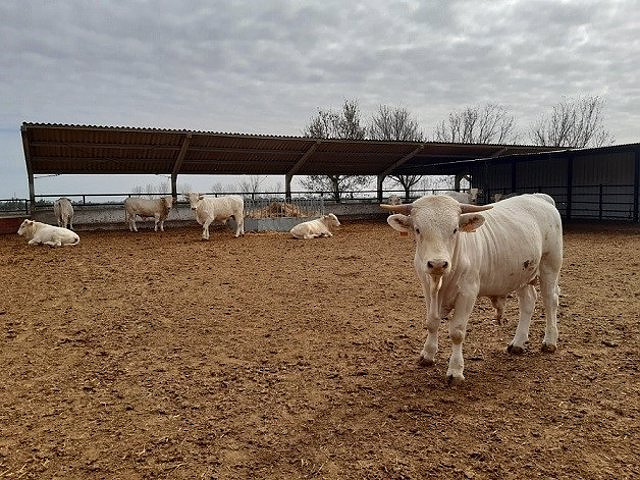Alert that using criminal law for matters leading to acquittal causes "a collective social feeling of failure"
MADRID, 19 Ene. (EUROPA PRESS) -
The Supreme Court (TS) has acquitted two men from Cáceres convicted of killing a cow, considering that their actions entail an administrative sanction, but not a criminal one, and warns that abusing criminal law "beyond what would be its limits natural" generates a "collective social feeling of failure" since some cases, such as this one in Extremadura, result in an acquittal.
The magistrates explain that "it is evident" that the "social reproach" that causes the death of an animal" --without following the norms established for the execution in cases of suffering--justifies a sanction. They qualify, however, that "the intensity and meaning of that reproach obtain a better treatment in the field of penalizing administrative law".
The court ruled on the case of two men who in April 2018 "by prior and mutual agreement" killed a cross-breed cow owned by one of them. They both got on a tractor and while one was driving the other shot the animal with a shotgun that belonged to his father and for which he did not have a weapons license.
According to the sentence, to which Europa Press has had access, the man "shot once and the cow fell." It has not been proven that the animal died at that moment or that it only fell to the ground badly injured. The men then transported the animal on the same tractor blade to a local building, where a company was in charge of collecting the remains.
The Court of Cáceres convicted both of them for a crime of aggravated animal abuse and imposed a sentence of 8 months in prison and 2 years of disqualification from the exercise of any profession related to animals.
The two ranchers took the case before the Supreme Court, considering that the facts declared proven do not imply unjustified mistreatment of the animal or its death as a result of the alleged mistreatment. The defense insisted that it was the "sacrifice of a bovine animal in a cattle farm" because the day before, "accidentally", the cow "had broken a hind leg".
Both men argued that processing the admission of the animal to the nearest slaughterhouse - which was about 100 kilometers away - would have increased the cow's pain for several days, so they opted for "a single and accurate shot."
To this argument, the Supreme Court responds that "there are therapeutic solutions within the reach of any veterinarian that could have alleviated that pain until the moment of his inevitable death."
In the resolution, for which Judge Manuel Marchena was the rapporteur, the court stressed that "the action of both defendants does not mitigate its illegality due to the fact that it was motivated by the desire to avoid further suffering to the cow, a being alive that cannot be considered as a simple object capable of being fired in any circumstance".
The magistrates recognize the "unquestionable" evolution of the regulatory system, which has made the protection of animals and the exclusion of their mistreatment a legal right capable of provoking the reaction of criminal law. "From the reductionist classification of these living beings as 'things', they have gone on to their legal definition as '*living beings endowed with sensitivity", they recall.
The Supreme Court, however, does not agree with the decision of the Cáceres Court to impose a sentence of 8 months in prison and 2 months of disqualification for a crime of aggravated animal abuse.
In 22 pages, the Criminal Chamber emphasizes that the "double projection of the coercive power of the State between administrative law and criminal law obliges, now more than ever, to claim the validity of the principles that legitimize the application of the norm penal".
The court stresses the need to "reserve" criminal law for "those offenses that most seriously offend the protected legal right." "Otherwise, we run the risk of amplifying criminal law beyond what would be its natural limits, encouraging what has been called, in very graphic locution, the 'expansive force of criminal law,'" he points out.
Thus, although the Supreme Court "has no doubt" that the execution of the animal "failed to comply with the regulatory requirements", it considers that the appeal filed by the defense should be upheld and, consequently, annul the penalty imposed on both farmers because this case must be sanctioned according to administrative law and not through criminal proceedings.
Faced with this scenario, the magistrates say they are aware that "the immediate effect" of adhering to the criminal law "is none other than the unfortunate conversion of any acquittal into a collective social feeling of failure."

 Exploring Cardano: Inner Workings and Advantages of this Cryptocurrency
Exploring Cardano: Inner Workings and Advantages of this Cryptocurrency Seville.- Economy.- Innova.- STSA inaugurates its new painting and sealing hangar in San Pablo, for 18 million
Seville.- Economy.- Innova.- STSA inaugurates its new painting and sealing hangar in San Pablo, for 18 million Innova.- More than 300 volunteers join the Andalucía Compromiso Digital network in one month to facilitate access to ICT
Innova.- More than 300 volunteers join the Andalucía Compromiso Digital network in one month to facilitate access to ICT Innova.-AMP.- Ayesa acquires 51% of Sadiel, which will create new technological engineering products and expand markets
Innova.-AMP.- Ayesa acquires 51% of Sadiel, which will create new technological engineering products and expand markets Dortmund storms Paris and reaches the final
Dortmund storms Paris and reaches the final Cos bids farewell to Congress warning that the lack of political consensus "affects economic prospects"
Cos bids farewell to Congress warning that the lack of political consensus "affects economic prospects" Two workers died and one injured when two floors collapsed in a building under construction in Fuencarral
Two workers died and one injured when two floors collapsed in a building under construction in Fuencarral The Government will wait until after the European elections to propose measures on democratic regeneration
The Government will wait until after the European elections to propose measures on democratic regeneration How Blockchain in being used to shape the future
How Blockchain in being used to shape the future Not just BTC and ETH: Here Are Some More Interesting Coins Worth Focusing on
Not just BTC and ETH: Here Are Some More Interesting Coins Worth Focusing on They develop devices for the precise diagnosis of cancer patients
They develop devices for the precise diagnosis of cancer patients UMH researchers are working on a high-quality apricot crop that requires less irrigation water
UMH researchers are working on a high-quality apricot crop that requires less irrigation water The UPV develops an application to improve the quality of life of patients with glioblastoma
The UPV develops an application to improve the quality of life of patients with glioblastoma A sensor system obtains the fingerprint of essential oils and detects if they have been adulterated
A sensor system obtains the fingerprint of essential oils and detects if they have been adulterated A million people demonstrate in France against Macron's pension reform
A million people demonstrate in France against Macron's pension reform Russia launches several missiles against "critical infrastructure" in the city of Zaporizhia
Russia launches several missiles against "critical infrastructure" in the city of Zaporizhia A "procession" remembers the dead of the Calabria shipwreck as bodies continue to wash up on the shore
A "procession" remembers the dead of the Calabria shipwreck as bodies continue to wash up on the shore Prison sentences handed down for three prominent Hong Kong pro-democracy activists
Prison sentences handed down for three prominent Hong Kong pro-democracy activists ETH continues to leave trading platforms, Ethereum balance on exchanges lowest in 3 years
ETH continues to leave trading platforms, Ethereum balance on exchanges lowest in 3 years Investors invest $450 million in Consensys, Ethereum incubator now valued at $7 billion
Investors invest $450 million in Consensys, Ethereum incubator now valued at $7 billion Alchemy Integrates Ethereum L2 Product Starknet to Enhance Web3 Scalability at a Price 100x Lower Than L1 Fees
Alchemy Integrates Ethereum L2 Product Starknet to Enhance Web3 Scalability at a Price 100x Lower Than L1 Fees Mining Report: Bitcoin's Electricity Consumption Declines by 25% in Q1 2022
Mining Report: Bitcoin's Electricity Consumption Declines by 25% in Q1 2022 Oil-to-Bitcoin Mining Firm Crusoe Energy Systems Raised $505 Million
Oil-to-Bitcoin Mining Firm Crusoe Energy Systems Raised $505 Million Microbt reveals the latest Bitcoin mining rigs -- Machines produce up to 126 TH/s with custom 5nm chip design
Microbt reveals the latest Bitcoin mining rigs -- Machines produce up to 126 TH/s with custom 5nm chip design Bitcoin's Mining Difficulty Hits a Lifetime High, With More Than 90% of BTC Supply Issued
Bitcoin's Mining Difficulty Hits a Lifetime High, With More Than 90% of BTC Supply Issued The Biggest Movers are Near, EOS, and RUNE during Friday's Selloff
The Biggest Movers are Near, EOS, and RUNE during Friday's Selloff Global Markets Spooked by a Hawkish Fed and Covid, Stocks and Crypto Gain After Musk Buys Twitter
Global Markets Spooked by a Hawkish Fed and Covid, Stocks and Crypto Gain After Musk Buys Twitter Bitso to offset carbon emissions from the Trading Platform's ERC20, ETH, and BTC Transactions
Bitso to offset carbon emissions from the Trading Platform's ERC20, ETH, and BTC Transactions Draftkings Announces 2022 College Hoops NFT Selection for March Madness
Draftkings Announces 2022 College Hoops NFT Selection for March Madness
























